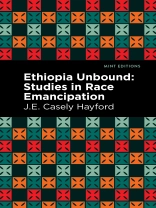Considered the first pan-Africanist work of fiction and among the earliest English novels written by an African author, Ethiopia Unbound: Studies in Race Emancipation is a classic of Ghanaian literature that continues to resonate with modern readers today.
“[T]he Nations were casting about for an answer to the wail which went up from the heart of the oppressed race for opportunity. And yet it was at best an impotent cry. For there has never lived a people worth writing about who have not shaped out a destiny for themselves or carved out their own opportunity.”
With this political statement, J.E. Casely Hayford begins his novel of African emancipation. Semi-autobiographical, it is the story of Kwamankra, a man who, like the author, traveled from Africa to London to become a lawyer. Through dialogue with his English friend Whitely, knowledge of historical and contemporary events in Africa, and his relationship with the lovely Mansa, Kwamankra comes to believe in full independence for his homeland and his people.
This edition of J. E. Casely Hayford’s Ethiopia Unbound: Studies in Race Emancipation is part of the Mint Editions catalog.
Since our inception in 2020, Mint Editions has kept sustainability and innovation at the forefront of our mission. Each and every Mint Edition title gets a fresh, professionally typeset manuscript and a dazzling new cover, all while maintaining the integrity of the original book.
With thousands of titles in our collection, we aim to spotlight diverse public domain works to help them find modern audiences. Mint Editions celebrates a breadth of literary works, curated from both canonical and overlooked classics from writers around the globe.
Giới thiệu về tác giả
J. E. Casely Hayford (1866-1930) was a Fante journalist, lawyer, educator, and politician. Born in Cape Coast, a city in what was then the British colony of Gold Coast, Hayford, who also went by Ekra-Agiman, belonged to a prominent family of cultural and political leaders. His father, a Methodist minister, was a politician; his mother was the descendant of an Irish trader and an African woman. Educated at Fourah Bay College in Sierra Leone, he was a follower of Liberian pan-Africanist Edward Wilmot Blyden. When Hayford was dismissed from his role as principal at Accra Wesleyan Boys’ High School, he began working as a journalist. In 1893, he traveled to London to study law and was called to the Bar three years later. In 1896, Hayford returned to Ghana with his wife Adelaide to establish a private law practice. In the twentieth century, he devoted himself to African emancipation as a journalist, politician, and activist. He was president of the Aborigine’s Rights Protection Society, a member of the Gold Coast’s Legislative Council, and a patron of the West African Students’ Union. In addition, Hayford gained an international audience with speeches at the International Conference of the Negro in 1912 and in his role as delegate to the League of Nations in 1920. His 1911 novel Ethiopia Unbound: Studies in Race Emancipation is considered the first work of pan-African fiction and one of the first English novels written by an African author.












